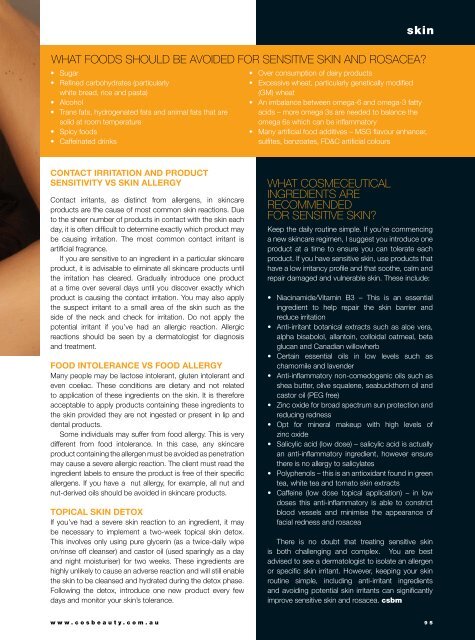Cosmetic Surgery and Beauty Magazine #67
Cosmetic Surgery and Beauty is the go-to magazine for anyone considering an aesthetic procedure. Covering a huge range of treatments with in-depth expert interviews and hundreds of before and after photos.
Cosmetic Surgery and Beauty is the go-to magazine for anyone considering an aesthetic procedure. Covering a huge range of treatments with in-depth expert interviews and hundreds of before and after photos.
You also want an ePaper? Increase the reach of your titles
YUMPU automatically turns print PDFs into web optimized ePapers that Google loves.
skin<br />
What foods should be avoided for sensitive skin <strong>and</strong> rosacea?<br />
• Sugar<br />
• Refined carbohydrates (particularly<br />
white bread, rice <strong>and</strong> pasta)<br />
• Alcohol<br />
• Trans fats, hydrogenated fats <strong>and</strong> animal fats that are<br />
solid at room temperature<br />
• Spicy foods<br />
• Caffeinated drinks<br />
• Over consumption of dairy products<br />
• Excessive wheat, particularly genetically modified<br />
(GM) wheat<br />
• An imbalance between omega-6 <strong>and</strong> omega-3 fatty<br />
acids – more omega 3s are needed to balance the<br />
omega 6s which can be inflammatory<br />
• Many artificial food additives – MSG flavour enhancer,<br />
sulfites, benzoates, FD&C artificial colours<br />
Contact irritation <strong>and</strong> product<br />
sensitivity vs skin allergy<br />
Contact irritants, as distinct from allergens, in skincare<br />
products are the cause of most common skin reactions. Due<br />
to the sheer number of products in contact with the skin each<br />
day, it is often difficult to determine exactly which product may<br />
be causing irritation. The most common contact irritant is<br />
artificial fragrance.<br />
If you are sensitive to an ingredient in a particular skincare<br />
product, it is advisable to eliminate all skincare products until<br />
the irritation has cleared. Gradually introduce one product<br />
at a time over several days until you discover exactly which<br />
product is causing the contact irritation. You may also apply<br />
the suspect irritant to a small area of the skin such as the<br />
side of the neck <strong>and</strong> check for irritation. Do not apply the<br />
potential irritant if you’ve had an allergic reaction. Allergic<br />
reactions should be seen by a dermatologist for diagnosis<br />
<strong>and</strong> treatment.<br />
Food intolerance vs food allergy<br />
Many people may be lactose intolerant, gluten intolerant <strong>and</strong><br />
even coeliac. These conditions are dietary <strong>and</strong> not related<br />
to application of these ingredients on the skin. It is therefore<br />
acceptable to apply products containing these ingredients to<br />
the skin provided they are not ingested or present in lip <strong>and</strong><br />
dental products.<br />
Some individuals may suffer from food allergy. This is very<br />
different from food intolerance. In this case, any skincare<br />
product containing the allergen must be avoided as penetration<br />
may cause a severe allergic reaction. The client must read the<br />
ingredient labels to ensure the product is free of their specific<br />
allergens. If you have a nut allergy, for example, all nut <strong>and</strong><br />
nut-derived oils should be avoided in skincare products.<br />
Topical skin detox<br />
If you’ve had a severe skin reaction to an ingredient, it may<br />
be necessary to implement a two-week topical skin detox.<br />
This involves only using pure glycerin (as a twice-daily wipe<br />
on/rinse off cleanser) <strong>and</strong> castor oil (used sparingly as a day<br />
<strong>and</strong> night moisturiser) for two weeks. These ingredients are<br />
highly unlikely to cause an adverse reaction <strong>and</strong> will still enable<br />
the skin to be cleansed <strong>and</strong> hydrated during the detox phase.<br />
Following the detox, introduce one new product every few<br />
days <strong>and</strong> monitor your skin’s tolerance.<br />
What cosmeceutical<br />
ingredients are<br />
recommended<br />
for sensitive skin?<br />
Keep the daily routine simple. If you’re commencing<br />
a new skincare regimen, I suggest you introduce one<br />
product at a time to ensure you can tolerate each<br />
product. If you have sensitive skin, use products that<br />
have a low irritancy profile <strong>and</strong> that soothe, calm <strong>and</strong><br />
repair damaged <strong>and</strong> vulnerable skin. These include:<br />
• Niacinamide/Vitamin B3 – This is an essential<br />
ingredient to help repair the skin barrier <strong>and</strong><br />
reduce irritation<br />
• Anti-irritant botanical extracts such as aloe vera,<br />
alpha bisabolol, allantoin, colloidal oatmeal, beta<br />
glucan <strong>and</strong> Canadian willowherb<br />
• Certain essential oils in low levels such as<br />
chamomile <strong>and</strong> lavender<br />
• Anti-inflammatory non-comedogenic oils such as<br />
shea butter, olive squalene, seabuckthorn oil <strong>and</strong><br />
castor oil (PEG free)<br />
• Zinc oxide for broad spectrum sun protection <strong>and</strong><br />
reducing redness<br />
• Opt for mineral makeup with high levels of<br />
zinc oxide<br />
• Salicylic acid (low dose) – salicylic acid is actually<br />
an anti-inflammatory ingredient, however ensure<br />
there is no allergy to salicylates<br />
• Polyphenols – this is an antioxidant found in green<br />
tea, white tea <strong>and</strong> tomato skin extracts<br />
• Caffeine (low dose topical application) – in low<br />
doses this anti-inflammatory is able to constrict<br />
blood vessels <strong>and</strong> minimise the appearance of<br />
facial redness <strong>and</strong> rosacea<br />
There is no doubt that treating sensitive skin<br />
is both challenging <strong>and</strong> complex. You are best<br />
advised to see a dermatologist to isolate an allergen<br />
or specific skin irritant. However, keeping your skin<br />
routine simple, including anti-irritant ingredients<br />
<strong>and</strong> avoiding potential skin irritants can significantly<br />
improve sensitive skin <strong>and</strong> rosacea. csbm<br />
www.cosbeauty.com.au 95


















